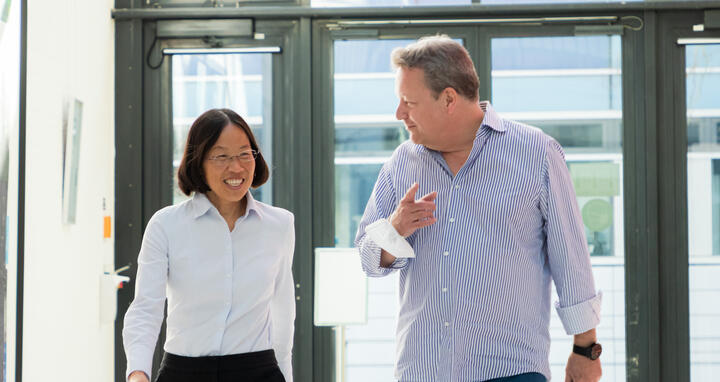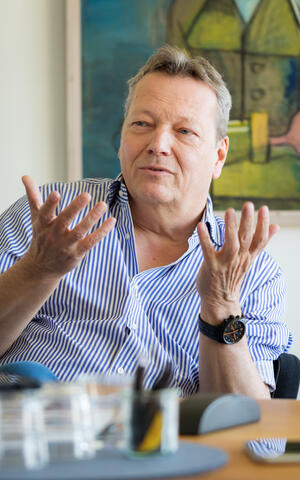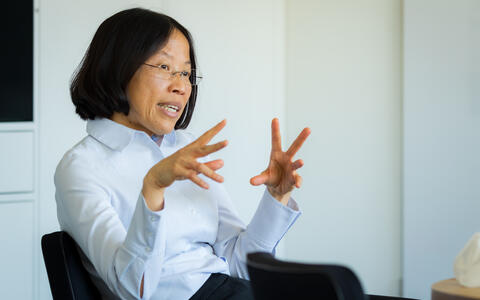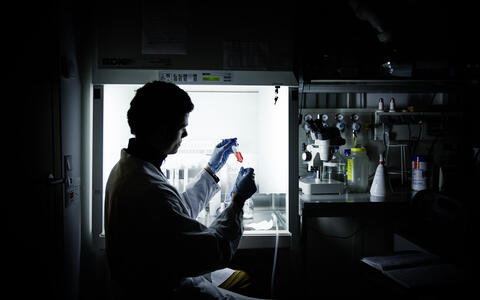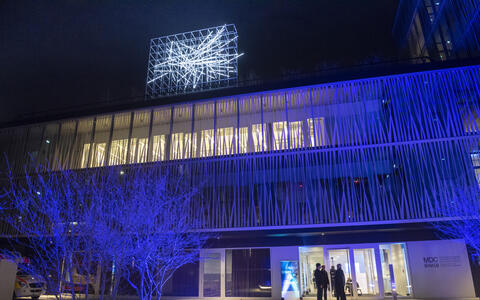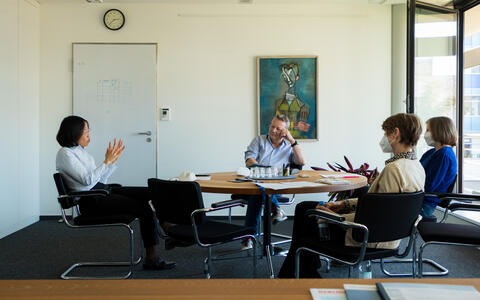“We don’t want to wait for disease to develop”
Prof. Sommer, you have been at the MDC since 1993. Do you remember those early days?
Thomas Sommer is the interim Scientific Director of the MDC, which is one the 18 research centers of the Helmholtz Association.
Prof. Thomas Sommer: There was a completely different mood at that time. Almost everyone here was from the East, the former GDR. Some of them needed reorientation, some didn’t know where they were headed. Others were excited about the new beginning and curious to see what might now be possible. The new staff members, many of them from the West, arrived right in the middle of this time of upheaval and renewal. It’s fair to say that two worlds collided.
In what sense?
Sommer: What those of us from the West felt was the lack of something that was usual back there – regulated, normalized procedures. Here, problems were solved differently. The people were more willing to improvise than us Westerners, or than all of us are nowadays. If something was missing from an incubator, for instance, no one said: “Let’s wait until we’ve bought a new part.” Instead, the experiment went ahead, even if they had to use gaffer tape or a piece of wire.
Impressive pioneering spirit
What was the impact of founding director Detlev Ganten, who led the MDC from 1992 to 2004?
Sommer: Detlev Ganten achieved two things. First, he brought in a whole new guard of scientists, but he didn’t forget those who were already here. He found options or new perspectives for many people who didn’t feel at home in the Western-dominated, excellence-driven science system. Certainly the EU funding as part of the Aufbau-Ost restructuring program will have helped with that. Ganten was also able to keep animosity and rivalry to a minimum. He was a father figure who made everyone feel welcome. And from the very beginning he kept extravagance in check. What he cared about was excellent research. On my first day he said to me: “You won’t get a Mercedes here, but you won’t get a Trabi either. You’ll get a good Volkswagen.”
Prof. Young-Ae Lee: I didn’t come to the campus until 2000. That’s when the genome center moved here as part of the German Human Genome Project. By then there were far fewer differences between East and West. I do remember that employees from the East used to shake your hand in greeting. I liked that expression of warmth and regard. I also liked the campus – with its forest-like greenery, and even the construction work going on all around. There was an atmosphere of something new and exciting happening. I was particularly impressed by the fact that the Ganten family and other researchers lived on campus. For me, that was an expression of this pioneering spirit.
Has the MDC grown up in the meantime, maybe becoming rather self-satisfied?
Sommer: Not at all. Science is always moving forward but it never arrives. A basic characteristic of all scientists – certainly of those here – is curiosity.
Let’s consider that word “curiosity.” Sometimes basic research is accused of being conducted purely for curiosity’s sake. It is alleged that the scientists are not interested in finding ways of applying their research, of bringing it to patients.
Sommer: For me, curiosity is a very positive term! All science is driven by curiosity. We keep asking new questions, developing new technologies. If we stop doing that, then we’re probably already dead.
The genome researcher and pediatrician Young-Ae Lee heads a research lab at the MDC and the Charité’s Outpatient Clinic for Pediatric Allergology and Atopic Dermatitis at the ECRC.
Lee: Our mission is golden. Molecular medicine is the MDC’s great strength. We want to understand the molecular mechanisms of disease, and we work closely with clinicians from an early stage. After all, the campus did start out as a clinical campus of the Charité research hospital. Today, the Experimental Clinical Research Center (ECRC) is the clinical part of MDC’s partnership with Charité, and we also have direct links with other clinics. That’s a real bonus.
So, getting to the topic of research for “curiosity’s sake:” Yes, there is hypothesis-driven research, and there is medically-oriented research. Not all work at the MDC has this direct link to clinical practice. But important studies are being conducted into the molecular mechanisms of life whose significance for our health will only become apparent later on. That kind of work is just as valuable. Basic research is of great worth and relevance. And the MDC has become a space where such research can be conducted. That is a treasure that I hope we can preserve.
„We need a well-informed public“
In recent times, especially during the pandemic, scientists have experienced greater demand for their expertise. At the same time, they have often had to publicly justify themselves; their work has been thrown into question. What does that mean for the MDC?
Sommer: I do believe that we, the scientific community, have to better communicate how scientific research works. We should explain that we work iteratively – repeating experiments, zeroing in on a problem, constantly correcting our results. Science progresses in many small steps, through mutual criticism and improvement. We must find ways to explain that. We need society to trust us, and in order to achieve that we need a well-informed public.
Lee: Science has never played a bigger role within societal dialogue and in the media than during the coronavirus pandemic. The development of vaccines was a milestone that saved many millions of lives, and in such a short time. I am full of admiration! I have mainly witnessed great appreciation and fantastic results. In that regard, this time has been a celebration of science.
You said that science needs the trust and the support of society.
Sommer: Science is key to the local economy. In a knowledge-based society, our future is secure. Berlin, in fact the entire Berlin-Brandenburg region, has incredible potential, and investment in research is really worthwhile. Jobs are being created here. Just look at the Buch campus or other places in and around Berlin – Adlershof, other cutting-edge sites, technology centers… That all adds up to something that can create economic power and prosperity and improve the standard of living for us all. Health research is at the forefront of that development.
Outstanding as a biomedical research institution
What are the MDC milestones?
MDC Berlin-Mitte (MDC-BIMSB)
Sommer: I’d say we’ve been through three phases. First there was the beginning phase when we were finding our feet. During that time, specialists from clinical practice ran laboratories here in our research buildings. That was an exciting time. Then there was the time, in the mid-90s, when the Helmholtz Association was founded and the MDC became a part of it. That meant we had to develop programs in areas where funding was available: cardiovascular systems, cancer, neurological disease, systems biology. And now, since 2021, we have been united in the cutting-edge program Systems Medicine and Cardiovascular Diseases and I sense another time of exciting change is brewing. We are pursuing single-cell approaches for personalized medicine, particularly at the MDC’s Berlin Institute for Medical Systems Biology. The new, spectacular BIMSB building in Berlin’s Mitte district opened in 2019. We have also demonstrated excellence in heart research and vascular biomedicine. We are forming new partnerships in those areas and cooperating closely with the Berlin Institute of Health at Charité. And, if I may say so, we are also performing well in international comparison. The MDC stands out as a biomedical research institute. We also have successful spin-offs such as T-knife, which develops novel immunotherapies against cancer that teach patients’ T cells to recognize and fight solid tumors.
What is systems medicine?
Sommer: We are investigating the molecular causes of many different illnesses. These may well be identical, as is the case with cancer and neurodegeneration. Or they might influence the progression of an infection. Another example is cystic fibrosis. For a long time it was considered a lung disease, but when the lungs were treated often other tissue got damaged. That’s because cystic fibrosis is caused by a mutation that affects various parts of the body.
f.l.t.r.: Young-Ae Lee and Thomas Sommer in interview with Jutta Kramm and Jana Schlütter
Lee: You have to think outside the box. We want to identify the underlying mechanisms of health and disease. We are taking a close look at mechanistic processes in the human body – such as fibrosis, inflammation, immunity – as interconnecting factors that influence the entire body. That is a totally innovative approach that will change medical care in the long term. It’s about prevention rather than cure. We don’t want to wait for disease to develop; we want to understand which molecular steps contribute to the development of the disease in order to intervene before it does any damage. Achieving that is the greatest dream of medical science!
Jutta Kramm and Jana Schlütter conducted the interview.
Further Information

